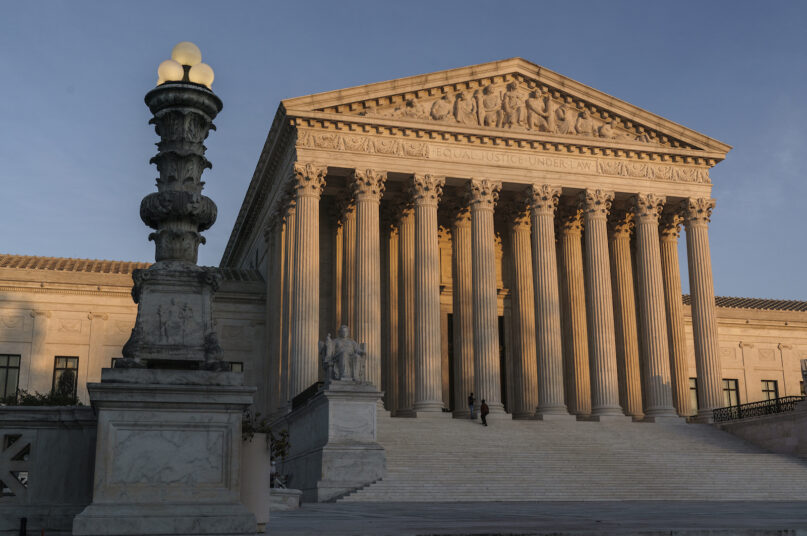(RNS) — The Supreme Court will soon issue a decision addressing the intersection of civil rights and religion. In Fulton v. Philadelphia, the Supreme Court will decide whether the First Amendment’s free exercise clause allows Catholic Social Services to discriminate against families headed by same-sex couples when providing taxpayer-funded public foster care services.
While most of the analysis and media commentary on this case has centered on the possible impact of the decision on LGBTQ Americans, we should also be aware of the possible impact of the ruling on religious minorities in the United States. A ruling that turns the free exercise clause into a license to discriminate could lead to more discrimination against religious minorities.
However the Supreme Court rules, its decision invites — and perhaps demands — an important discussion among people of faith. (And it is important to remember that people of faith includes the LGBTQ community.) While on its surface a win for Catholic Social Services seems like a win for the religious, legalizing taxpayer-funded religious discrimination risks harming both LGBTQ families and religious minorities. If a taxpayer-funded religious social services organization can discriminate against individuals based on the assertion their sexual orientations are inconsistent with the organization’s own religious tenets, it can almost certainly discriminate against individuals whose religious beliefs are inconsistent with its religious tenets.
As a practicing member of the Church of Jesus Christ of Latter-day Saints, I am acutely aware of the harm of discrimination based on one’s faith; the need to avoid such religiously based discrimination against certain types of families has real resonance with both my beliefs and my not-so-distant ancestry. In the second half of the nineteenth century, Latter-day Saints faced discrimination that was ultimately legally sanctioned by the U.S. Supreme Court.
Much has changed in the intervening 140 years. Today, even if the Supreme Court allows social service agencies to discriminate in the name of religion, my coreligionists and I are unlikely to bear the brunt of that discrimination. That is not to say discrimination against us is impossible. The taxpayer-funded agency Miracle Hill Ministries in South Carolina, for example, refuses to place foster children with parents who do not affirm its Protestant Christian doctrinal statement.
A Catholic mother is currently suing the agency because she could not affirm its doctrinal statement and was therefore denied the ability to foster children. The statement’s content is similarly foreign to Latter-day Saint beliefs, and I would likewise be unable to affirm it. If we allow agencies providing services on behalf of the government to discriminate based on their own religious beliefs, we will ensure more discrimination against Catholics and Orthodox Christians, as well as Latter-day Saints, Muslims, Jews, Buddhists, Hindus and atheists.
People who share my faith play significant roles in all aspects of American life. Still, we recognize and remember the sting of having our families devalued and degraded. Even more than a century later, the pain of persecution still resonates with us and should guide us toward empathy. We need to act in solidarity with all those who face discrimination, whether it’s because of their religion, their family formation, or any other part of their identity. Our empathy for those who face discrimination is not based solely on our collective history and concern for the future of our own religious freedom. We also have a religious mandate to stand in solidarity, not with discriminators, but with those facing discrimination.
We have the same religious injunctions that other Christian religions face, particularly Jesus’ empathetic mandate we mourn with those who mourn and comfort those in need of comfort. But we also have our own unique religious mandates. In 1843, church founder and prophet Joseph Smith declared he would defend not only the rights of Latter-day Saints, but also of others. Why? Because “the same principle which would trample upon the rights of the Latter-day Saints would trample upon the rights of the Roman Catholics, or of any other denomination who may be unpopular and too weak to defend themselves. It is a love of liberty which inspires my soul — civil and religious liberty to the whole of the human race.”
In short, all Americans should be concerned about what might happen if the Supreme Court establishes a constitutional right to discriminate when that discrimination is motivated by religious beliefs. Americans of all backgrounds have long been committed to the principle that discrimination is wrong, even if we don’t always get it right. I hope and pray the Supreme Court will get it right this time.
(Samuel D. Brunson is the Georgia Reithal Professor of Law at Loyola University Chicago School of Law. The views expressed in this commentary do not necessarily reflect those of Religion News Service.)





